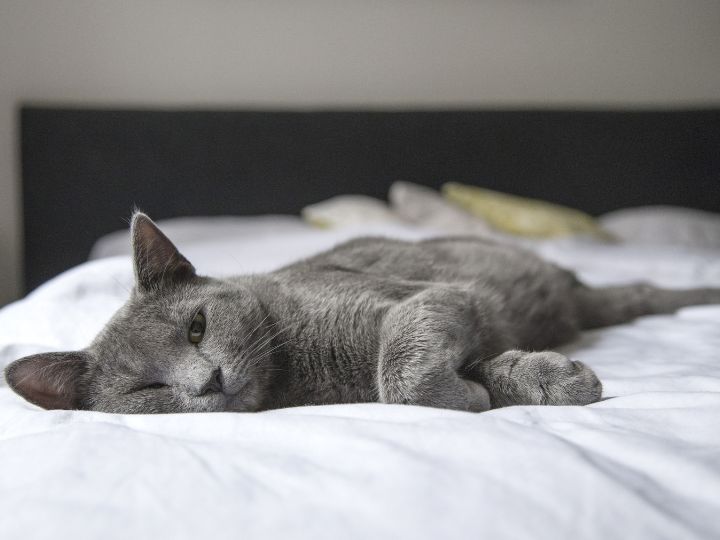Photos of cats with wide-set eyes, flat noses, or unusual behavior often go viral under the label “Down syndrome cat.” But is this real?
No, cats cannot have Down syndrome. The condition is caused by an extra copy of chromosome 21 in humans. But cats only have 19 chromosome pairs, so it’s biologically impossible for them to develop true Down syndrome.
Still, some cats are born with genetic disorders or congenital defects that mimic the appearance or behaviors associated with Down syndrome.
What Causes “Down Syndrome”- Like Traits in Cats?
When a cat shows unusual features or behavior, it’s usually due to one of the following conditions:
Congenital Defects
Birth defects can affect facial features, mobility, or organ development, leading to traits like flattened faces or abnormal coordination.
Genetic Mutations
Spontaneous genetic changes can cause developmental delays, facial asymmetry, or unusual proportions.
Cerebellar Hypoplasia
A neurological disorder where the cerebellum is underdeveloped. Symptoms include tremors, wobbly walking, and poor coordination.
Hydrocephalus
Fluid buildup in the brain leads to a swollen head, wide-set eyes, and potential vision or cognitive issues.
Feline Dysautonomia
This rare condition affects the autonomic nervous system, disrupting pupil response, muscle tone, and appetite.
Brain Injury or Trauma
Injuries before or shortly after birth may affect motor skills or learning ability.
Prenatal Infections or Toxin Exposure
Viral infections like panleukopenia or environmental toxins during pregnancy can interfere with brain and body development.
These conditions may look similar to down syndrome but require very different treatments and diagnosis.
What Are the Signs Mistaken for Down Syndrome in Cats?
People may assume a cat has Down syndrome if they show:
- Wide-set, almond-shaped, or misaligned eyes
- A flat, upturned, or broad nose
- Small, unusually shaped ears
- Wobbly gait or poor balance
- Unusual vocalizations or delayed reactions
- Hearing or vision issues
- Weak muscle tone
- Possible heart or organ irregularities
These traits can result from multiple different conditions, not Down syndrome.
What Is Often Referred to as “Feline Down Syndrome”?
When someone refers to a “Down syndrome cat,” they are usually talking about a cat with neurological or congenital differences. A popular example is Monty the cat, who has a unique face due to a chromosomal abnormality. While Monty does not have Down syndrome, his story has helped raise awareness and support for special-needs pets.
How to Care for a Cat with Special Needs
If your cat shows unusual traits or behaviors, compassionate care is essential. Here’s how to help:
- Create a calm, quiet environment to reduce stress
- Use non-slip mats or carpeting to help with mobility
- Be patient with litter training and social development
- Schedule regular vet visits for monitoring
- Watch for changes in balance, hearing, or vision
- Avoid stairs or high perches if the cat has poor coordination
- Consult a vet for a custom care plan
Every cat has different needs depending on their diagnosis. A professional evaluation is crucial.
FAQs
What Is the Life Expectancy of a Down Syndrome Cat?
Cats cannot have true Down syndrome, but those with similar traits caused by genetic or neurological conditions can often live 12 to 16 years. With proper care and regular vet checkups, these cats can enjoy long, healthy lives just like any other feline.
Can Cats Be Tested for Down Syndrome or Similar Conditions?
There is no specific test for Down syndrome in cats, but veterinarians can run diagnostic exams to check for genetic disorders, neurological issues, or congenital defects. These may include physical exams, imaging (like X-rays or MRIs), and genetic testing to identify the root cause of unusual traits.
What Does “Cat with Severe Down Syndrome” Mean?
A “cat with severe Down syndrome” is not a medically accurate term. Cats cannot have Down syndrome, but some may show serious traits like wide-set eyes, poor balance, and cognitive delays due to other conditions such as hydrocephalus or cerebellar hypoplasia.
Wrap up
Cats cannot biologically have Down syndrome, but some are born with unique conditions that deserve attention and compassion. Instead of relying on social media labels, consult a vet if your cat appears different or behaves unusually.
With understanding and proper care, these special cats can live happy, healthy, and love-filled lives, just like any other feline



